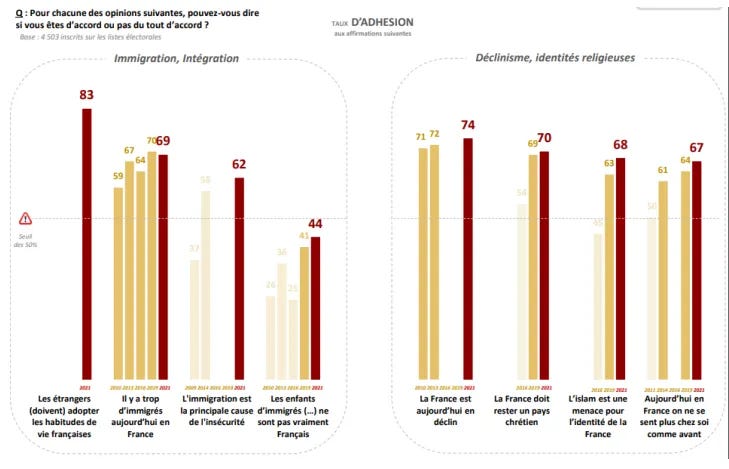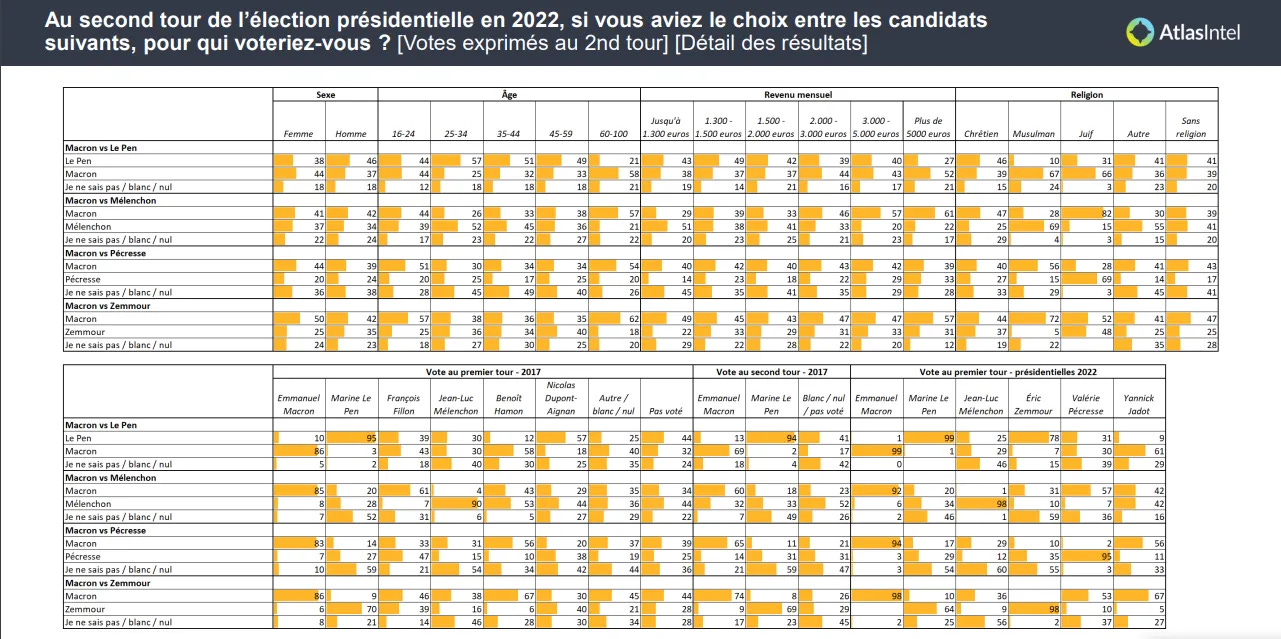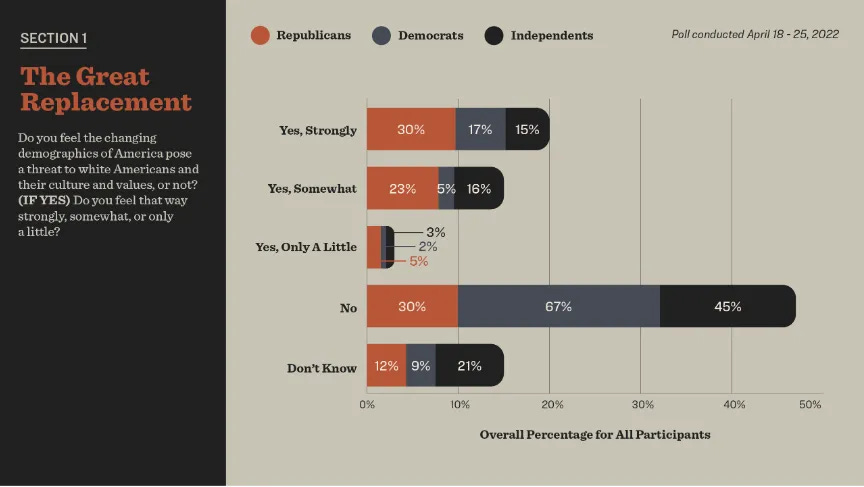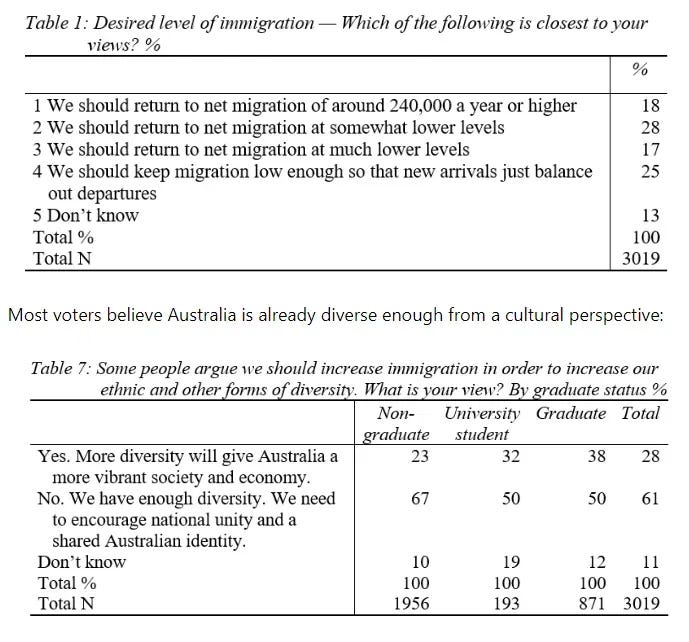Nationalists often debate the methods by which the public could be made aware of the Great Replacement, and indeed if this type of mass awareness could even be accomplished. The good news is that it has already occurred in a number of countries, most significantly in France.
More than half of the French population believe that the Great Replacement is real and ongoing, according to an opinion poll done by the Institut français d'opinion publique. A further 63% of the French do not “feel safe anywhere” in their own country and 69% believe there are too many immigrants in France. Nearly half of all Frenchmen do not believe that the children of immigrants can truly be French. This is up from just 25% in 2016.
Another poll conducted by Harris in 2021, found that upwards of 61% of the French population is aware of the Great Replacement and believes it is more fact than fiction, because, of course, it is.
The Great Replacement has become such a mainstream topic of conversation that the Leaders of political parties, ranging from the young replacement for Le Pen, Jason Bardella, to the (now former) leader of Les Républicains, Valérie Pécresse, have mentioned the Great Replacement in public venues and in front of crowds of thousands of people, often on the campaign trail. This phenomenon extends far beyond the political, however.
The French cultural scene has become deeply involved in mainstreaming the realities of the Great Replacement. Just last year the famed French writer, poet, novelist, and filmmaker Michel Houellebecq brought public awareness of the Great Replacement to new levels when he stated:
“The Great Replacement, I was shocked it is called a theory. It is not a theory, it is a fact … When it comes to immigration, nobody controls anything—that is the whole problem. Europe will be swept away by this cataclysm.”
Houellebecq’s partner in his exchange, the noted philosopher Michel Onfray, went on to agree, saying:
”This is objectively what the numbers say.”
This awareness, this public debate, has translated into increasing political action. Young people in France, especially in the 25-34-year-old age group, are voting in the majority for politicians who use Great Replacement rhetoric in their election campaigns.
Public awareness of the Great Replacement has reached such a point that watchdogs against ‘extremism’ now believe that some 40% of the French population are politically activated by the issue, and this number is growing by double digits with each electoral cycle.
In the United States, where the issue is still unfortunately caught in the partisan political framework of the Republican and Democratic parties, Americans are increasingly aware of the Great Replacement and its undisputable reality. Over 40% of Americans were willing to tell the Southern Poverty Law Center (SPLC) that the changing demographics of the United States “pose a threat to White Americans and their culture and values”. About 46% of Americans did not believe demographic change posed a threat to Whites, while the remaining 14% did not know.
Particularly fascinating in these data was the willingness of young Americans to admit that the Great Replacement was a deliberate process. 63% of young Republican men and 54% of young Democratic men, were willing to admit they viewed the demographic changes in the United States as a deliberate process to replace Whites. 61% of young Republican women also shared the same belief.
Going beyond the first two examples we can find data from a 2019 EKOSPOLITICS poll of Canadians which found that 40% of Canadians believed there were too many visible minorities in Canada. Visible minorities is the polite, and official, Canadian term for non-Westerners. This figure is the highest figure since 1995 when just under 50% of Canadians believed there were too many recent immigrants and their descendents present in their country.
Data published by the Friedrich Ebert Stiftung shows that a full third of Germans, particularly German women, and working-class men, are sure the Großer Austausch is a reality in their nation and the broader West. It is no wonder then that AfD has risen to be the second-highest polling party in Germany and is now the most popular party with Germany’s youth, the demographic that competes most directly with the large waves of immigrants.
The government of Italy, including ministers such as Mr. Lollobridga, has spoken publicly about the ethnic replacement of Italians. His party, the same as Prime Minister Giorgia Meloni, has won two elections on a quasi-nationalist platform despite failing to deliver on policy promises.
Data from the Australian Population Research Institute (TAPRI), gathered in 2022, shows that some 70% of Australians want lower levels of immigration and 61% of Australians believe that Australia “has enough diversity” and needs to focus on encouraging Australian identity. Another poll, this time from the Lowy Institute surveys conducted in 2024 shows that 48% of Australians believe that immigration to the country is too high while only 10% of Australians want to see it increase and 40% believe it is “about right”.
The question for nationalists, especially those of us living outside of France, is how to turn the widespread public awareness of the Great Replacement into a broader cultural discussion. Only by taking the issue to all levels of society will the ruling class can nationalists make our case against the Great Replacement.
Support White Papers’ mission to investigate and promote nationalist policies!
Zelle: whitepapersinstitute@protonmail.com
Buy us a coffee: https://www.buymeacoffee.com/wppi
Linktree: https://linktr.ee/wppi
Snail Mail: White Papers Policy, PO Box 192, Hancock, MD 21750








